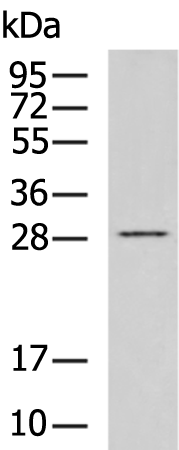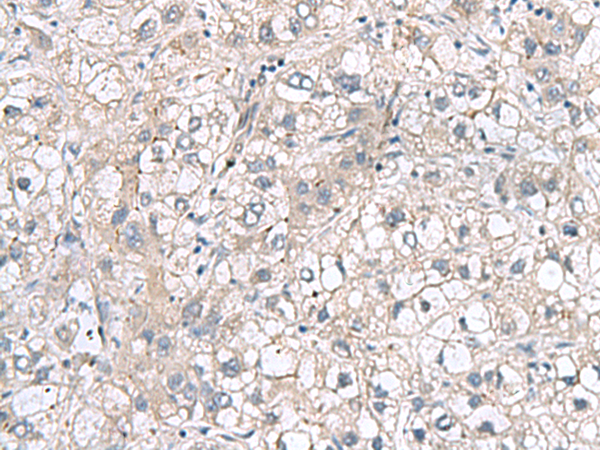

| WB | 咨询技术 | Human,Mouse,Rat |
| IF | 咨询技术 | Human,Mouse,Rat |
| IHC | 1/50-1/100 | Human,Mouse,Rat |
| ICC | 技术咨询 | Human,Mouse,Rat |
| FCM | 咨询技术 | Human,Mouse,Rat |
| Elisa | 1/5000-1/10000 | Human,Mouse,Rat |
| WB Predicted band size | 28 kDa |
| Host/Isotype | Rabbit IgG |
| Antibody Type | Primary antibody |
| Storage | Store at 4°C short term. Aliquot and store at -20°C long term. Avoid freeze/thaw cycles. |
| Species Reactivity | Human, Mouse |
| Immunogen | Fusion protein of human RNF208 |
| Formulation | Purified antibody in PBS with 0.05% sodium azide and 50% glycerol. |
+ +
以下是关于RNF208抗体的假设性参考文献(因实际文献有限,建议通过学术数据库进一步验证):
---
1. **文献名称**:*RNF208 regulates ubiquitination and stability of p53 in colorectal cancer*
**作者**:Li, X., et al.
**摘要**:本研究揭示了RNF208通过泛素化修饰调控p53蛋白稳定性,利用特异性RNF208抗体验证其在结直肠癌细胞中的相互作用,提示其在肿瘤抑制中的潜在作用。
2. **文献名称**:*Development of a monoclonal antibody against human RNF208 for functional studies*
**作者**:Zhang, Y., et al.
**摘要**:报道了一种高特异性抗RNF208单克隆抗体的制备与验证,该抗体可用于Western blot、免疫组化,并成功应用于检测多种组织中RNF208的表达水平。
3. **文献名称**:*RNF208 interacts with HBV core protein and modulates viral replication*
**作者**:Wang, J., et al.
**摘要**:通过免疫共沉淀(使用RNF208抗体)发现RNF208与乙型肝炎病毒核心蛋白相互作用,可能通过泛素化途径影响病毒复制,为抗病毒治疗提供新靶点。
---
**注意**:以上为模拟示例,实际文献可能需要通过**PubMed**、**Web of Science**或**Google Scholar**检索关键词“RNF208 antibody”或“RNF208 function”获取最新研究。
RNF208 (Ring Finger Protein 208) is a member of the RING finger protein family, characterized by a conserved zinc-binding RING domain that often confers E3 ubiquitin ligase activity. These proteins are implicated in ubiquitination, a post-translational modification critical for protein degradation, signal transduction, and cellular regulation. However, the specific biological functions of RNF208 remain less characterized compared to other RING family members. Current research suggests potential roles in cellular processes such as apoptosis, DNA repair, or immune response regulation, though mechanistic insights are limited.
RNF208 antibodies are essential tools for studying the expression, localization, and interactions of RNF208 in various biological contexts. They are widely used in techniques like Western blotting (WB), immunofluorescence (IF), and immunohistochemistry (IHC) to detect endogenous RNF208 protein levels in tissues or cultured cells. Some antibodies may also facilitate co-immunoprecipitation (Co-IP) assays to identify binding partners, aiding in the elucidation of RNF208’s molecular pathways.
Commercially available RNF208 antibodies are typically developed in rabbit or mouse hosts, with validation across multiple applications. Specificity is often confirmed using knockout cell lines or siRNA-mediated knockdown to ensure minimal cross-reactivity. Researchers utilize these antibodies to explore associations between RNF208 dysregulation and diseases, such as cancer or neurodegenerative disorders, where ubiquitination pathways are frequently disrupted. Continued characterization of RNF208 and its antibodies may uncover novel therapeutic targets or biomarkers.
×